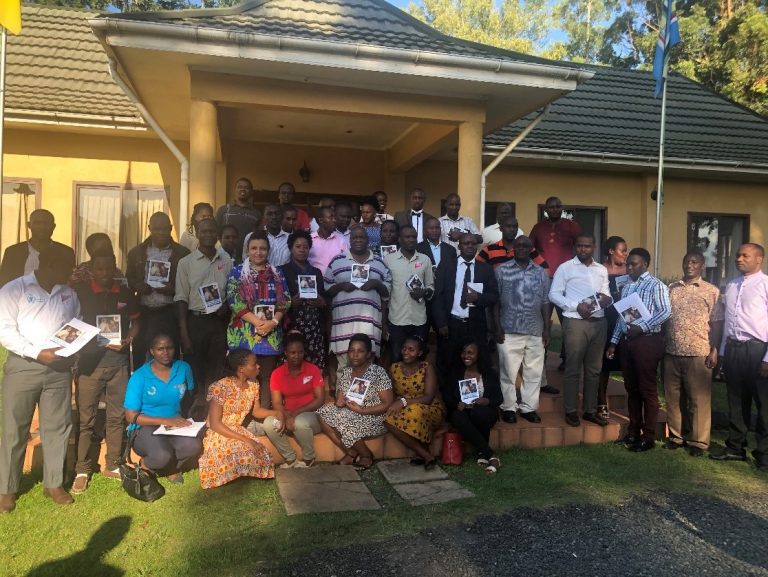In Uganda, the percentage of newborn deaths for all under-five deaths sits around 41%, and the newborn mortality rate is 20 deaths per 1,000 live births. 27% of neonatal deaths in Uganda in 2017 were due to preterm birth complications. Uganda’s large refugee population is a major contributor to these figures, and the humanitarian setting in the region requires action to ensure quality newborn care. In the humanitarian setup, by virtue of maternal services, newborns also receive basic level care. For the advanced level of services, however, newborns are referred to the host community health facilities.
Uganda has been hosting refugees and asylum seekers since achieving its independence in 1962. The country has been praised for having one of the most progressive and generous refugee laws and policy regimes in the world. In fact, the 2016 United Nations Summit for Refugees declared Uganda’s refugee policy a model[1]. Uganda is currently host to over 1.4 million refugees and it is predicted this number could grow up to 1.8 million by the end of 2018, according to UNHCR. Approximately 74 per cent of all refugees are from South Sudan. However, as of December 2017 there has been a sharp increase in new arrivals from the Democratic Republic of Congo (DRC)[2]. In the Eastern and Southern Africa Region (ESAR), most countries have incorporated newborn into their national emergency plans and Uganda is one of them. The 2018 launch of the “Newborn Health in Humanitarian Settings: Field Guide” allowed for an opportunity to disseminate key information about how to address newborn health in these settings.
With the financial and technical support from UNICEF ESAR, UNICEF Uganda collaborated with the National, regional and district Ministries of Health to conduct an orientation workshop with key stakeholders such as UNHCR, AVSI Foundation, Médecins Sans Frontières, CUAMM, MIT, Care International and others. This workshop would act as the driving force to educate and support health care professionals in addressing newborn health, particularly in the humanitarian context.
The first workshop took place in Arua, Northern Uganda and the second workshop took place in Fort portal, Eastern Uganda as both regions are hosting most of the refugee populations within Uganda.

Over 100 participants combined attended across both workshops. These participants included representatives from regional and district health authorities, local NGOs working as implementing partners, front line health care providers such as neonatologists and obstetricians, and professionals from Epidemiology, Water, Sanitation and Hygiene, Monitoring and Evaluation, Gender and Nutrition sectors.
The workshop enabled participants and supporting organizations to achieve the following:
- Educate participants on the Newborn Humanitarian Guide and draft Global Newborn Strategy for Newborn Humanitarian Settings (2020-2025)
- Discuss the results of the SWOT (Strengths, Weaknesses, Opportunities, Threats) analysis
- Become sensitized to the needs of newborns in both development and humanitarian settings
- Prioritize plan of action for participants respective districts –including:
- Strengthen community engagement to identify and address community bottlenecks
- Use of data from the surveillance team ensure preparedness and effective response in time
- Conduct training of managers, health professionals, community gate leaders and other stakeholders on newborn and patient friendly services.
- Improve logistical support and redistribution of commodities
- Improve scientific evidence and innovation on models of care in fragile and humanitarian settings
- Come to a consensus on the inclusion of newborn health in the national emergency preparedness plans=
At the conclusion of the workshop, Dr. Emmanuel Ochieng (Team lead of Medical Teams International (MTI), one of the participants, commended the initiative: “The orientation workshop was very vital in bringing attention to newborn health issues in humanitarian settings. Me and my team, we learnt more on the quality of care for newborns and the SWOT analysis discussion was very beneficial. We will be able to put emphasis and include the component of the Newborn health when preparing emergency support work plans. Following the orientation, the team has embarked on more advocacy with the teams providing maternity care in the settlements, to look at issues of quality of care for newborns during their work, especially with the available resources.”
With these achievements, workshop participants will be able to implement the necessary changes to properly address the newborn health challenges in their humanitarian settings.
Acknowledgements: We are grateful for the generosity of the Government of the Kingdom of the Netherlands’s seed fund to UNICEF ESAR for protecting and empowering children on the move.
[1] https://data2.unhcr.org/en/documents/download/64687
[2] https://www.unocha.org/southern-and-eastern-africa-rosea/uganda
